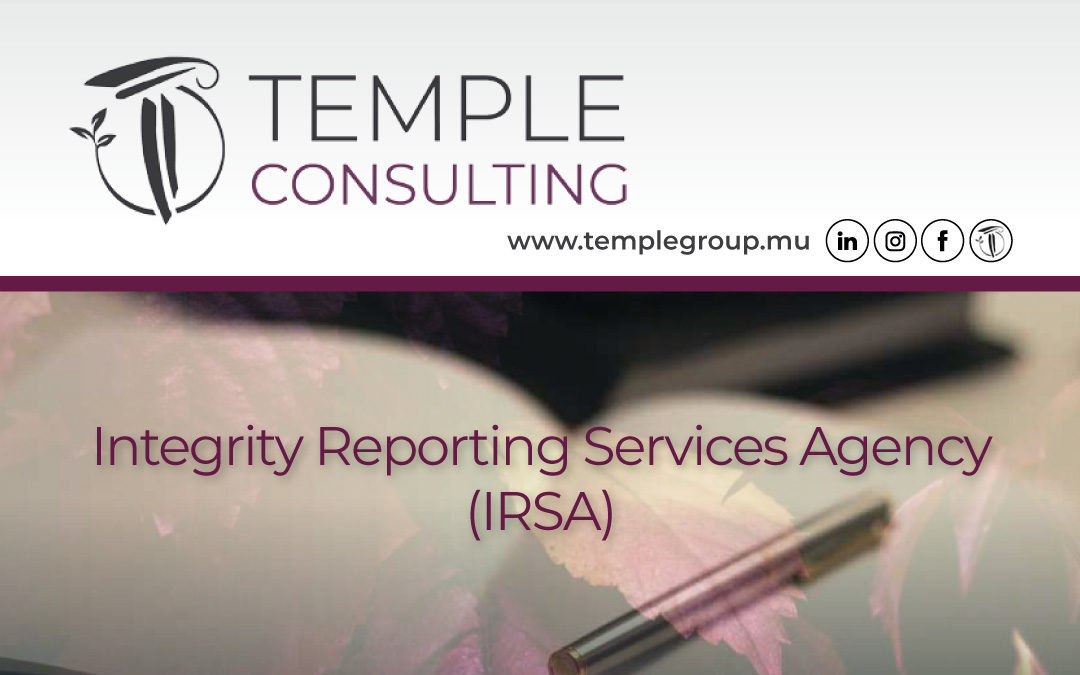The Good Governance and Integrity Reporting Act 2015 (the Act), aims to promote a culture of good governance and integrity reporting in Mauritius so as to reinforce the reputation of our island as a renown international financial center and impeachable integrity to encourage investments in our country. The main objects of the Act are:
- To promote a culture of good governance and integrity reporting in Mauritius;
- To stimulate in integrity reporting in both public and private sectors;
- To disclose malpractices and recover unexplained wealth; and
- To protecting and reward those coming to make declarations and reports.
Established under Section 4 of the Good Governance and Integrity Reporting Act 2015, the Integrity Reporting Services Agency (IRSA) has as its mission to investigate wealth that demands an explanation and where the wealth has not been satisfactorily explained, the matter is referred to the Court for confiscation.
A brief overview on how the IRSA works:
- Whenever the Commissioner of Police, a judicial officer, the Ombudsman, the Director of Audit, the Director of the Financial Intelligence Unit, the Director-General of Independent Commission Against Corruption, the Director-General of the Mauritius Revenue Authority, the Governor of the Bank of Mauritius, an integrity reporting officer nominated by a public interest entity or an officer of a statutory corporation, or body corporate, during the exercise of his functions, has reasonable grounds to suspect that a person has acquired unexplained wealth, he shall make a written report to the IRSA.
It is to be noted that any other person who has reasonable grounds to suspect that a person has acquired unexplained wealth can initiate the same action as the above-mentioned individuals.
- Following the report, IRSA carries out a thorough investigation of all reports and when appropriate, summons the holder of the wealth by way of affidavit within 21 working days, or any such longer period which the Director may determine, to explain how he acquired it.
The person may be called to explain the origins of any funds he holds, owns, possesses, has custody or control of, which are believed to have been used in the acquisition of any property.
- Once the necessary enquiry pertaining to the justification on the sources of funds is done, the IRSA shall report the matter to Integrity Reporting Board. At this stage, the IRSA cannot initiate any action, unless directed by the Board.
The Board will consider the report submitted by the IRSA and when it has reasonable grounds to believe that a person has unexplained wealth, it shall direct the IRSA to make an application to a Judge in Chambers for an Unexplained Wealth Order for the confiscation of that wealth.
- Where the Judge in Chambers is satisfied that the respondent has unexplained wealth, he shall then make the Unexplained Wealth Order which as a consequence will lead to the confiscation of that unexplained wealth. On the contrary, where the Judge in Chambers is of opinion that an application for an Unexplained Wealth Order cannot be granted on the basis of affidavit evidence, he shall refer the matter to the Supreme Court.
- Finally, the money that is retrieved from the confiscated property is then deposited in the National Recovery Fund and is used to alleviate poverty and pay rewards for acts of good governance and for reports leading to the confiscation of unexplained wealth.


Recent Comments